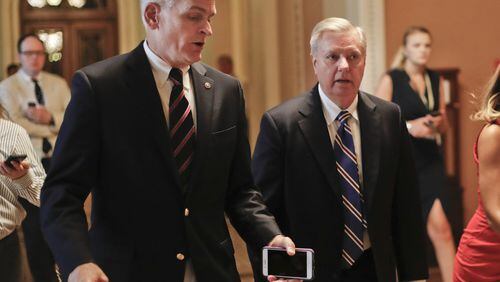The Republican effort to repeal and replace Obamacare seemed all but dead this summer. Now it’s not. Again.
Against all odds, Georgians both for and against the effort are watching warily as GOP leaders try one last pass at taking down the signature health care law of the Obama administration before their ability to do so expires Sept. 30.
What exactly the legislation’s impact would be on Georgia isn’t entirely clear, since federal analysts will not have time to research the provisions before the hoped-for vote next week. One thing that is clear is the impact — like that of some of the previous bills — would be momentous. It drew howls of protest from many of the same advocates who opposed previous efforts, fearful that patients and health care businesses and workers will suffer. And it drew applause from those who supported previous efforts; even more fervent applause from some in Georgia who saw one provision in particular they’d been seeking.
Most significantly for the bill’s Georgia supporters, it clearly attains a long-held goal: treat Georgia as well or better than states that did expand Medicaid.
“I’m all in,” said David Perdue, Georgia’s junior Republican senator and a reliable backer of President Donald Trump, who was incensed when the Senate gave up. Perdue enthusiastically backed the plan after he and his Republican colleagues huddled Tuesday afternoon with Vice President Mike Pence.
“I love the idea that we’re giving states a lot more autonomy on this thing,” Perdue said.
Most fundamentally, the bill would restructure Medicaid, a fundamental alteration to a half-century-old entitlement program. Instead of paying for every legitimate service, Medicaid would henceforth give a block of money to each state. If the state ran out of money before all the services were paid for, the services would not be paid for.
Related: What you should know about Medicaid in Georgia
One question is how to determine how much money each state will get. This bill would treat the 19 states that did not expand Medicaid better than previous bills would. In fact, Georgia State University health funding expert Bill Custer said, Georgia could make out even better financially at the beginning of this bill than under the current system.
That’s something Republicans such as Georgia Gov. Nathan Deal have fought for since the beginning.
A spokeswoman for Deal, however, did not respond to requests for comment Tuesday. And the fact is, that “pretty quickly” the value of Georgia’s block grant would erode as the years wore on and medical inflation and a growing patient population took its toll, Custer said. Any need to fill that growing funding gap, he said, “would be borne entirely by state taxpayers.”
GOP supporters counter that the bill would give states more flexibility to design programs that use the limited money better.
Many top Georgia GOP officials have taken a more cautious stance on the legislation in public as the White House and Republican leaders have worked furiously in recent days to round up support.
Like previous bills this summer, this one seems to remain just short of the 50 votes it needs to pass, with the vice president breaking the tie. An effort is being made, however, to appease Arizona Republican U.S. Sen. John McCain, who voted down the last effort after calling for the issue to be hashed out in committee hearings. Leaders said they would hold one hearing on the bill next week.
Lawmakers on Capitol Hill are on an incredibly tight timeline to approve the legislation, which has informally taken on the name of its two main Republican co-authors, U.S. Sens. Bill Cassidy of Louisiana and Lindsey Graham of South Carolina. In order to avoid a Democratic filibuster, both chambers of Congress must pass the measure by Sept. 30.
That gives lawmakers less than two weeks to pull together a plan that would rework approximately one-sixth of the U.S. economy.
Jimmy Lewis, a consultant to small hospitals, hopes they move on.
“I think in an attempt to hurry a piece of legislation through for political gain and benefit,” Lewis said, “we may put a whole class of providers in real jeopardy: rural hospitals and subsequently rural patients.”
At a certain point creativity doesn’t help if there isn’t money to be creative with, Lewis said. He expects more people will be uninsured, and show up to hospitals, and those hospitals will suck up the debt from caring for them.
Helen Robinson, a women’s health advocate and director of advocacy at the YWCA of Greater Atlanta, also panned the effort. She opposes the legislation because it “puts the lives and health of women in our state at risk.”
“Georgia already has one of the worst maternal mortality rates and one of highest rates of women who are uninsured in the country,” she said.
She said the bill would “drastically cut” Medicaid over time, which covers half of Georgia births and prenatal care.
The bill also would forbid Medicaid from paying for non-abortion services at Planned Parenthood, which include breast and cervical cancer screenings.
Other Georgians were more sympathetic to that provision.
Mark Wingate leads a core group of Fulton County Republican donors and volunteers. He has mixed feelings: He doesn’t like Graham much, so he’s not an automatic supporter. And what he’d really like is to see is Obamacare actually repealed — though he wouldn’t want the protection for coverage of previously existing conditions cut.
However, he said, “In terms of re-engineering the health care mechanism of this country, yes. It needs to be done … and not simply because the Republicans the last eight years have clamored about Obamacare. I’m not going to buy into that circus conversation. But something needs to be done because premiums and deductibles are just not serving the country.”
Perdue’s Georgia GOP colleague in the Senate, Johnny Isakson, was more tentative, saying in a statement that he wanted to learn more about the legislation during a hearing next week before making a decision.
“In addition to closely following this hearing and studying the legislation, I am consulting with Governor Nathan Deal and stakeholders from across Georgia to determine whether this bill will accomplish the right thing for Georgians and all Americans,” Isakson said in a statement to The Atlanta Journal-Constitution.









